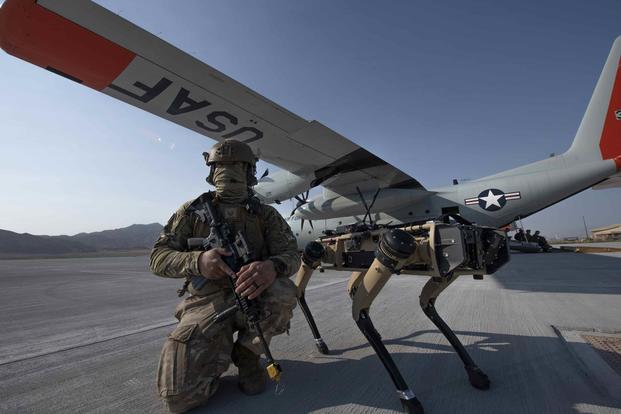This article by Jared Keller originally appeared on Task & Purpose, a digital news and culture publication dedicated to military and veterans issues.
The Air Force deployed an unusual new system during a recent exercise: "Robot dogs" designed to enhance the situational awareness of security forces during a mission.
The robot dogs -- developed by Ghost Robotics as part of an Air Force Research Laboratory contract awarded back in April -- were deployed last week to Nellis Air Force Base in Nevada as part of an agile combat employment exercise during which airmen scrambled to secure a simulated airfield against hostile attack.
The exercise, conducted by active-duty and Air National Guard airmen from across the United States, was planned to test the Air Force's next-generation Advanced Battle Management System, "a state-of-the-art system designed to provide combatant commanders the ability to control Department of Defense assets in real-time," according to the Air Force.
The specific model robot dog is technically called the Vision 60, a military-grade version of Ghost Robotics' Quadrupedal Unmanned Ground Vehicle (UGV) platform that's designed for intelligence, surveillance and reconnaissance (ISR) missions; distributed communications; and "persistent security," as The War Zone put it.
"Beyond all-terrain stability and operation in virtually any environment, a core design principle for our legged robots is reduced mechanical complexity when compared to any other legged robots, and even traditional wheeled-tracked UGVs," according to Ghost Robotics. "By reducing complexity, we inherently increase durability, agility, and endurance, and reduce the cost to deploy and maintain ground robots."
During the exercise, airmen assigned to the 321st Contingency Response Squadron, 621st Contingency Response Wing, flew from Buckley Air Force Base in Colorado to Nellis AFB via a 109th Airlift Wing LC-130 Hercules aircraft and secured the airfield.
The Vision 60 robot dogs provided visual assessments of the area while allowing 621st CRW airmen to maintain a tighter perimeter to the aircraft as the other supporting airmen arrived on the scene, according to Master Sgt. Lee Boston, CR team chief for the exercise and 321 CRS loadmaster.
The exercise eventually saw a second C-130, an MC-130J Commando II, and four F-16 Fighting Falcons undergo rapid re-arming and refueling on the ground while the robot dogs stood watch alongside security forces.
While details are scarce regarding the specific capabilities tested on the Vision 60 robot dogs during the ABMS demonstration, photos published to the Defense Visual Information Distribution Service show airmen from the 621st CRW operating with multiple variants of the platform -- likely a testament to the modular design touted by Ghost Robotics.
"Our modular design even supports field swapping any sub-assembly within minutes," according to Ghost Robotics. "Strategic partners can build solution-specific Q-UGVs for virtually any use-case with their choice of sensors, radios, and even size the robot to suit specific requirements by licensing our reference designs."
For more details on the ABMS and how the Vision 60 robot dogs fit in, check out this detailed analysis at The War Zone. In the meantime, here's a video of those robot dogs in action:
-- This article originally appeared at Task & Purpose. Follow Task & Purpose on Twitter.
More articles from Task & Purpose:
• COVID-19 squashes some of the Marine Corps' biggest balls
• The Belarusian military is testing a three-wheeled murdercycle
• Alwyn Cashe just took the field on the helmet of a Steelers player and former Army Ranger











